Tuesday Feb 24, 2026
Tuesday Feb 24, 2026
Thursday, 28 July 2016 00:01 - - {{hitsCtrl.values.hits}}
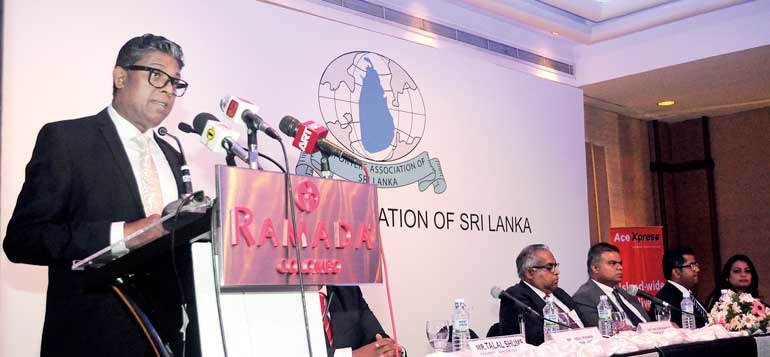 Our Chief Guest, Hon. Ravi Karunanayake, Minister of Finance, Guest of Honour, Mr. Samantha Ranathunga, Chairman the Ceylon Chamber of Commerce, other members of the head table, distinguished invitees, committee members, members of the EASL, members of the media, ladies and gentlemen, good evening.
Our Chief Guest, Hon. Ravi Karunanayake, Minister of Finance, Guest of Honour, Mr. Samantha Ranathunga, Chairman the Ceylon Chamber of Commerce, other members of the head table, distinguished invitees, committee members, members of the EASL, members of the media, ladies and gentlemen, good evening.
Firstly, I thank the management committee for the confidence they have placed in me by re-electing me as the Chairman at this 19th AGM of the EASL.
Last year, upon assuming this office as Chairman of the EASL in July 2015, Sri Lanka was at a political turning point, where we had an election to vote in a new era of good governance under the leadership of His Excellency Maithripala Sirisena as President in January 2015 and a minority government under the leadership of the Hon. Ranil Wickremesinghe as prime minister was formed, ushering in a unity government for the first time in the history of this country.
An ambitious 100-day program was embarked on, leading to a parliamentary general election in August of the same year, where the people of Sri Lanka elected both the main political parties to form a national government.
Reflecting on my acceptance speech last year, I appealed to the then deputy minister of trade Dr. Harsha de Silva, our Guest of Honour, that exports had been neglected for far too long and that there was a dire and urgent need for a strong and positive political will and vision to support, restore and transform the export sector within its potential.
I asked that whilst taking into account the backdrop of a global economic situation, we needed to be competitive with emerging exporting economies such as Bangladesh, Vietnam and Myanmar which continued to grow their exports despite external constraints.
With the winds of change in the political arena, we wanted more inclusiveness in shaping policy within the scope of public- private sector partnering, where we wanted Government to walk the talk and develop a new model of advocacy under the banner of good governance.
My committee and I were excited to be asked to develop a position paper to put forward our recommendations to develop a national strategy for exports.
Thus the EASL developed the document titled ‘Recommendations for a national export strategy’ (NEDEVS) where we identified cost-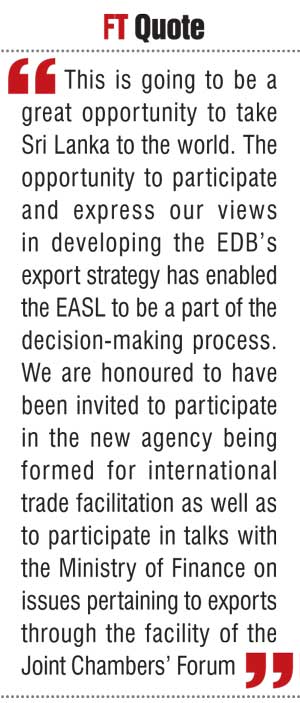 cutting issues on a macro level through extensive consultation with stakeholders in the industry and recognised expert economists in the field of exports.
cutting issues on a macro level through extensive consultation with stakeholders in the industry and recognised expert economists in the field of exports.
The time and support we received as we shared the document with policymakers was most encouraging, more so when we observed that the prime minister’s policy statement on November 2015 reflected attention and resolution of most of the key elements of concern recorded in our document. I can again reaffirm today, our wholehearted support towards realising his vision for a prosperous and vibrant Sri Lanka.
Key findings
Some of the key factors that stood out in our findings were:
I am pleased to state that we have been able to share our recommendations of the National Export Strategy (NEDEVS) with all line ministries in particular with the Ministry of Finance, the Ministry of Development Strategies and International Trade, the Taskforce for International Trade, the Foreign Ministry and the office of the PM, all government bodies such as EDB, DOC, Central Bank and other stakeholders such as the IMF and IPS, including other research organisations, as well as with all trade chambers and association stakeholders and our parent chamber the Ceylon Chamber of Commerce.
While these are small steps they have nevertheless paved the way for us to have greater engagement with the Ministry of Finance, Ministry of Development Strategies and International Trade and the EDB.
I need to place on record our appreciation of the Hon. Ravi Karunanayake, Hon. Malik Samarawickrama and Hon. Sujeewa Senasinghe and the Chairperson of EDB Mrs. Indira Malwatte for conducting their business in a more inclusive manner. This doesn’t mean that we don’t express different views but we are able to work with the Government with open dialogue and interaction.
We work with the philosophy of engagement as opposed to confrontation.
We wanted greater inclusiveness in policymaking and engagement through public-private partnerships and for which we appreciate the EDB for taking a bold step and inviting all private sector chambers to be a part of the Steering Committee of the World Export Development Forum (WEDF) which is to be held in Sri Lanka in October this year.
This is going to be a great opportunity to take Sri Lanka to the world. The opportunity to participate and express our views in developing the EDB’s export strategy has enabled the EASL to be a part of the decision-making process. We are honoured to have been invited to participate in the new agency being formed for international trade facilitation as well as to participate in talks with the Ministry of Finance on issues pertaining to exports through the facility of the Joint Chambers’ Forum.
In this last year, we have also interacted closely with our parent chamber, the Ceylon Chamber of Commerce, and other export chambers. We are now laying the groundwork to tackle common issues facing our industry through one voice on a single platform which will include all other stakeholder chambers involved in exports. Through this initiative we will be looking at working collectively with the several organisations with dedicated concerns regarding exports towards the betterment of the industry we all represent.
I, like my colleagues, understand that the Government has been hard-pressed to carry on business as usual in the midst of the many challenges it has had to face such as the global economic slowdown, depleted foreign reserves, servicing debt repayments, environmental disasters. Brexit and the unexpected consequences it will have to address are going to need positive thinking in order to capture opportunities in the face of adversity.
These challenges are not exclusive to Sri Lanka. Whilst we ponder the downside and fallouts, etc., our neighbouring countries are outsmarting us and have faster growth rates, while we are running around like headless chickens.
(Source: World Bank)
The need to change and adapt to face these new challenges can no longer be dealt with through a ‘wait and see’ policy. We can no longer be reactive to circumstances but we should now be proactive and prepared to recognise the challenges with forethought. Thus change in the mindset of all parties involved is imperative and must be addressed now.
Red tape and the overlapping of functions of several ministries, several strategic initiatives being undertaken by several agencies on the same topic of trade and strategic policy has created an environment of confusion and inconsistency.
What we need is a political policy agreed to by all coalition partners of the Government, accountability of ministries and more importantly making the prime minister’s policy statement the driving vision of this country.
We need to collectively work on public-private partnership and engage all areas of trade viz a viz FTA, bilateral trade, economic diplomacy, etc. and remove all red tape and hurdles to endeavour to make Sri Lanka’s ranking in the Ease of Doing Business to be within the top five in Asia and top 20 in the global ranking.
We may need to look at examples of Vietnam and Dubai and study their model of how they attracted the top brands to set up there. We can’t continue to rely on our existing basket of products.
We need to put aside our differences of views and make the country our first goal. We need to understand that we are merely one island, one drop in the ocean and we need to think out of the box and use our strengths of our geographical location and resources to our maximum benefit. We need to think big.
For this, I appeal to all stakeholder chambers involved in exports; we have been silent far too long and have been politically correct. It’s time we all spoke with one voice and became the drivers of our industry.
We fully endorsed our Prime Minister’s recent speech made during his visit to Singapore: “My country Sri Lanka has been ranked the highest in economic freedom in the region by the Heritage Foundation, which has been pioneering economic liberalisation in South Asia. Yet today in Sri Lanka we are also forging a fresh political initiative – a politics of convergence to consolidate democracy.” He further states in his speech that maximising on these factors will transform Sri Lanka into a geo-economic centre of South Asia, dynamically and synergically engaged with the rest of the region.
The Hon. Ravi Karunanayake, sir I have tried to spell out the status of our industry within a short address and my humble wish is that we the private sector and Government start to walk the talk together.
I thank my fellow members of the Managing Committee, especially the core group of members for all their support extended throughout last year and in particular the first Vice Chair Mr. Harin De Silva, and second Vice Chair Mr. Chrisso de Mel for sharing the burden of this office.
I thank the Ceylon Chamber for their support and encouragement and the secretariat for all the back office work done but not seen by many; all the past chairs who have supported us the office bearers to carry out our duties.
I have always believed in having an inner voice to crystallise my ideas into action and words. For this I am indebted to Mrs. Nirmali Samatunga, Mrs. Dawn Austin and Mr. Gulam Chatoor.
Lastly, my Chairman Dr. Nugawela, without whose support I would not have been able to carry out the responsibilities of being the chairman.
The late Mr. Lalith Athulathmudali wrote after his near-death experience: “Life is never to be given away, it can only be taken from us.”
Let’s us not give away our place in the global marketplace, let unite to grow our exports to greater heights.
I thank you for your patient hearing. Thank you.
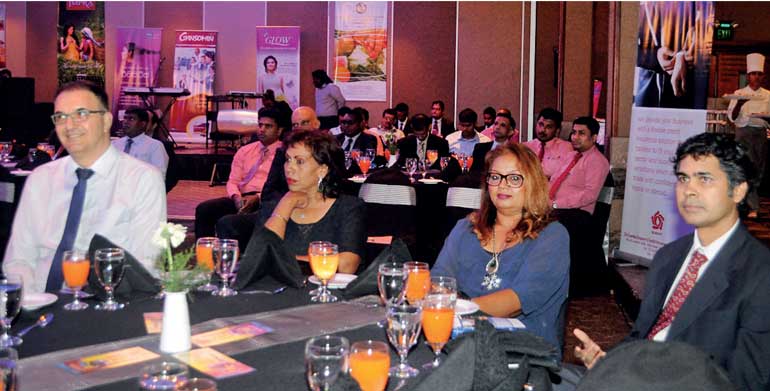
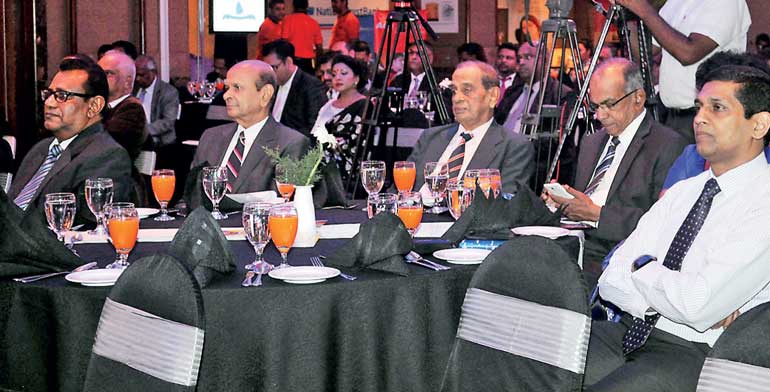
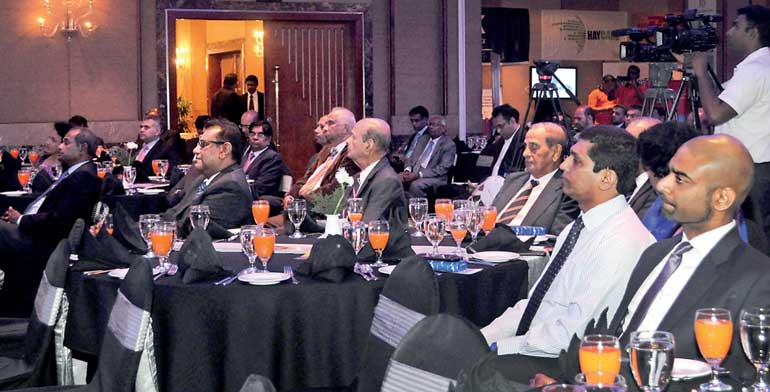
Pix by Gitika Talukdar